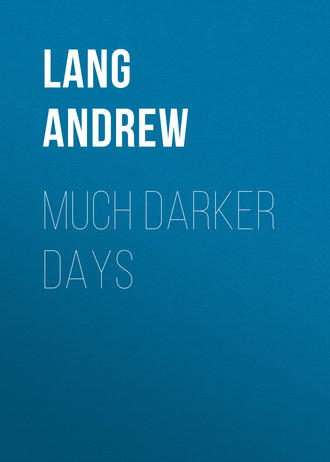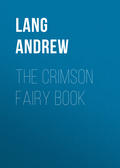
Lang Andrew
Much Darker Days
CHAPTER III. – Mes Gages! Mes Gages!
NEXT morning came, chill and grey, and reminded me that I had two duties. I was to wait at home till Philippa came over from Mrs. Thompson’s, and I was also to hang about the road from the station, and challenge Sir Runan to mortal combat. Can duties clash? They can. They did! The hours lagged slowly by, while I read Sir Runan’s letter, read and re-read it, registered and re-registered (a pretty term of my own invention) this vow of vengeance.
Philippa’s ‘things ‘ – her boxes with all her properties – arrived in due time.
Philippa did not.
I passed a distracted day, now bounding forth half way to the railway station to meet Sir Runan, now speeding back at the top of my pace to welcome Philippa at the ‘pike.
As I knew not by what train Sir Runan would reach Roding, nor when Philippa might be looked for, I thus obtained exercise enough to make up for months of inaction.
Finally the last train was due.
It was now pitch-dark and snowing heavily, the very time which Philippa generally chose for a quiet evening walk.
I rushed half-way to Roding, changed my mind, headed back, and arrived at the ‘pike.
‘Has a lady called for me?’ I asked the Sphynx.
‘Now, is it likely, sir?’ answered my fellow, with rough humour.
‘Well, I must go and meet her,’ I cried, and, hastily snatching a bull’s-eye lantern and policeman’s rattle from the Sphynx, I plunged into the darkness.
First I hurried to Mrs. Thompson’s, where I learned that Philippa had just gone out for a stroll after a somewhat prolonged luncheon. This was like Philippa. I recognised that shrinking modesty which always made her prefer to veil her charms by walking about after nightfall.
Turning from Mrs. Thompson’s, I felt the snow more sharply on my face. Furiously, blindly, madly it whirled here and drifted there.
Should I go for Sir Runan? Should I wait where I was? Should I whistle for a cab? Should I return to the ‘pike?
Suddenly out of the snow came a peal of silvery laughter. Philippa waltzed gracefully by in a long ulster whitened with snow.
I detected her solely by means of my dark lantern.
I rushed on her, I seized her. I said, ‘Philippa, come back with me!’
‘No, all the fun’s in the front,’ shrieked Philippa. ‘My quarter’s salary! Oh, my last quarter’s salary!’
With these wild words, like bullets from a Gatling gun rattling in my ears, I seized Philippa’s hand.
Something fell, and would have rattled on the hard high road had it not been for the snow.
I stooped to pick up this shining object, and with one more wild yell of ‘My quarter’s salary!’ Philippa waltzed again into the darkness.
Fatigued with the somewhat exhausting and unusual character of the day’s performances, and out of training as I was, I could not follow her.
Mechanically, I still groped on the ground, and picked up a small chill object.
It was a latch-key! I thrust it in my pocket with my other keys.
Then a thought occurred to me, and I chucked it over the hedge, to serve as circumstantial evidence. Next I turned and went up the road, springing my rattle and flashing my bull’s-eye lantern on every side, like Mr. Pickwick when he alarmed the scientific gentleman.
Suddenly, with a cry of horror, I stopped short. At my very feet, in the little circle of concentrated light thrown by the lantern, lay a white crushed, cylindrical mass.
That mass I had seen before in the warm summer weather – that mass, once a white hat, had adorned the brows of that masher!
It was Sir Runan’s topper!
CHAPTER IV. – As A Hatter!
YES, the white hat, lying there all battered and crushed on the white snow, must be the hat of Sir Runan! Who else but the tigerish aristocrat that disdained the homely four-wheeler and preferred to walk five miles to his victim on this night of dread – who else would wear the gay gossamer of July in stormy December?
In that hat, thanks doubtless to its airy insouciant grace, he had won Philippa; in that hat he would have bearded her, defied her, and cast her off! The cruelty of man! The larger and bulkier crumpled heap which lay on the road a little beyond the hat, that heap with all its outlines already blurred by snow, that heap must be the baronet himself!
Oh, but this was vengeance, swift, deadly vengeance!
But how, but how had she wreaked it? She, already my heart whispered she!
Was my peerless Philippa then a murderess?
Oh, say not so; call hers (ye would do so an she had been an Irish felon) ‘the wild justice of revenge,’ or the speedy execution of the outraged creditor.
Killed by Philippa!
Yes, and why? The answer was only too obvious. She must have gone forth to meet him, and to wring from him, by what means she might, that quarter’s salary which the dastard had left unpaid. Then my thoughts flew to the door-key, the cause of that fierce family hatred which burned between Philippa and her betrayer. That latch-key she had wrested from him, it had fallen from her hand, and I – I had pitched it into space!
Overcome with emotion, I staggered in the direction of the ‘pike. All the way, in the blinding, whirling snow, I traced the unobliterated prints of a small fairy foot.
This was a dreary comfort! Philippa had gone before me; the prints of the one small foot were hers. She must, then, have hopped all the way! Could such a mode of progression be consistent with a feeling of guilt? Could remorse step so gaily?
My man William, the Sphynx, opened the door to me. Assuming a natural air, I observed: —
‘Miss South is at home?’
‘Yes, sir. Just come in, sir.’
‘Where is she now?’
‘Well, sir, she just is on the rampage. “I’ll make ‘is fur fly,” she up and sez, sez she, when she heard as you was hout. Not a nice young lady for a small tea-party, sir,’ he added, lowering his voice; ‘a regular out-and-outer your sister is, to be sure.’
The Sphynx, in spite of his stolidity, occasionally ventured upon some slight liberty when addressing me.
I made a gay rejoinder, reflecting on the character of his own unmarried female relations, and entered the room.
Philippa was sitting on the lofty, dark oak chimney-piece, with her feet dangling unconventionally over the fireplace. The snow, melting from her little boots and her hair, had made a large puddle on the floor.
I came up and stood waiting for her to speak, but she kept pettishly swinging her small feet, as one who, by the action, means to signify displeasure.
‘Philippa,’ I said sternly, ‘speak to me.’
‘Well, here’s a gay old flare-up!’ cried Philippa, leaping from the chimney-piece, and folding her arms fiercely akimbo.
‘Who are you? Where’s the baby? You a brother; you’re a pretty brother! Is this the way you keep ‘pointments with a poor girl? Who killed the baby? You did – you all did it.’
Her words ran one into the other, as with an eloquence, which I cannot hope to reproduce (and indeed my excellent publisher would not permit it for a moment), she continued to dance derisively at me, and to heap reproaches of the most vexatious and frivolous nature on my head.
‘Philippa,’ I remarked at last, ‘you frivol too much.’
A sullen look settled on her face, and, with the aid of a chair, she reseated herself in her former listless, drooping attitude upon the chimney-piece.
On beholding these symptoms, on hearing these reproaches, a great wave of joy swept over my heart. Manifestly, Philippa was indeed, as Mrs. Thompson had said, ‘as mad as a hatter.’ Whatever she might have done did not count, and was all right. We would plead insanity.
She had fallen a victim to a mental disease, the source of which I have no hesitation in saying has not yet been properly investigated. So far as I know there is no monograph on the subject, or certainly I would have read it up carefully for the purpose of this Christmas Annual. I cannot get on without a mad woman in my stories, and if I can’t find a proper case in the medical books, why, I invent one, or take it from the French. This one I have invented.
The details of Philippa’s case, though of vast and momentous professional interest, I shall reserve for a communication to some journal of Science.
As for the treatment, I measured out no less than sixty drops of laudanum, with an equal amount of very old brandy, in a separate vessel. But preparing a dose and getting a patient like this to take it, are two different things. I succeeded by the following device.
I sent for some hot water and sugar and a lemon. I mixed the boiling element carefully with the brandy, and (separately) with the laudanum.
I took a little of the former beverage. Philippa with unaffected interest beheld me repeat this action again and again. A softer, more contented look stole over her beautiful face. I seized the moment. Once more I pressed the potion (the other potion) upon her.
This time successfully.
Softly murmuring ‘More sugar,’ Philippa sank into a sleep – sound as the sleep of death.
Philippa might awaken, I hoped, with her memory free from the events of the day.
As Princess Toto, in the weird old Elizabethan tragedy, quite forgot the circumstance of her Marriage, so Philippa might entirely forget her Murder.
When we remember what women are, the latter instance of obliviousness appears the more probable.
CHAPTER V. – The White Groom
I SHALL, I am sure, scarcely be credited when I say that Philippa’s unconsciousness lasted for sixteen days. I had wished her to sleep so long that the memory of her deeds on the awful night should fade from her memory. She seemed likely to do so.
All the time she slept I felt more and more secure, because the snow never ceased falling. It must have been thirty feet deep above all that was mortal of Sir Runan Errand. The deeper the better. The baronet was never missed by any one, curious to say. No inquiries were made; and this might have puzzled a person less unacquainted than myself with the manners of baronets and their friends.
Sometimes an awful fascination led me along the road where I had found the broken, battered mass. I fancied I could see the very drift where the thing lay, and a dreary temptation (dating probably from the old times when I had some wild beasts in the exhibition) urged me to ‘stir it up with a long pole.’ I resisted it, and, bitterly weeping, I turned away towards Philippa’s bedside.
As I walked I met Mrs. Thompson.
‘Does she hate him?’ she asked suddenly.
‘Forgiveness is a Christian virtue,’ I answered evasively.
I could not trust this woman.
‘Listen,’ she said, ‘and try to understand. If I thought she hated him, I would tell her something. If she thought you hated them, he would tell me something. If ye or you thought he hated her, I would tell him something. I will wait and see.’
She left me to make the best (which was not much) of her enigmatical words.
She was evidently a strange woman.
I felt that she was mixed up in Sir Runan’s early life, and that we were mixed up in Sir Runan’s early death – in fact, that everything was very mixed indeed.
She came back. ‘Give me your name and college,’ she said, ‘not necessarily for publication,’ and I divined that she had once been a proctor at Girton. I gave her my address at the public-house round the corner, and we parted, Mrs. Thompson whispering that she ‘would write.’
On reaching home I leaped to Philippa’s apartment.
A great change had come over her.
She was awake!
I became at once a prey to the wildest anxiety.
The difficulties of my position for the first time revealed themselves to me. If Philippa remained insane, how was I to remove her from the scene of her – alas! of her crime? If Philippa had become sane, her position under my roof was extremely compromising. Again, if she were insane, a jury might acquit her, when the snow melted and revealed all that was left of the baronet. But, in that case, what pleasure or profit could I derive from the society of an insane Philippa? Supposing, on the other hand, she was sane, then was I not an ‘accessory after the fact,’ and liable to all the pains and penalties of such a crime?
Here the final question arose and shook its ghostly finger at me: ‘Can a sane man be an accessory after the fact in a murder committed by an insane woman?’
So far as I know, there is no monograph on this subject, or certainly I would have consulted it for the purpose of this Christmas Annual.
All these questions swept like lightning through my brain, as I knelt by Philippa’s bedside, and awaited her first word.
‘Bon jour, Philippine,’ I said.
‘Basil,’ she replied, ‘where am I?’
‘Under my roof – your brother’s roof,’ I said.
‘Brother! oh, stow that bosh!’ she said, turning languidly away.
There could not be a doubt of it, Philippa was herself again!
I rose pensively, and wandered out towards the stables.
Covered with white snow over a white macintosh, I met by the coach-house door William, the Sphynx.
The White Groom!
Twiddling a small object, a door-key of peculiar make, in his hand, he grinned stolidly at me.
‘She’s a rum un, squire, your sister, she be,’ chuckled the Sphynx.
‘William,’ I said, ‘go to Roding, and bring back two nurses, even if they have to hire twenty drags to draw them here. And, William, bring some drugs in the drags.’
By setting him on this expedition I got rid of the Sphynx. Was he a witness? He was certainly acquainted with the nature of an oath!






